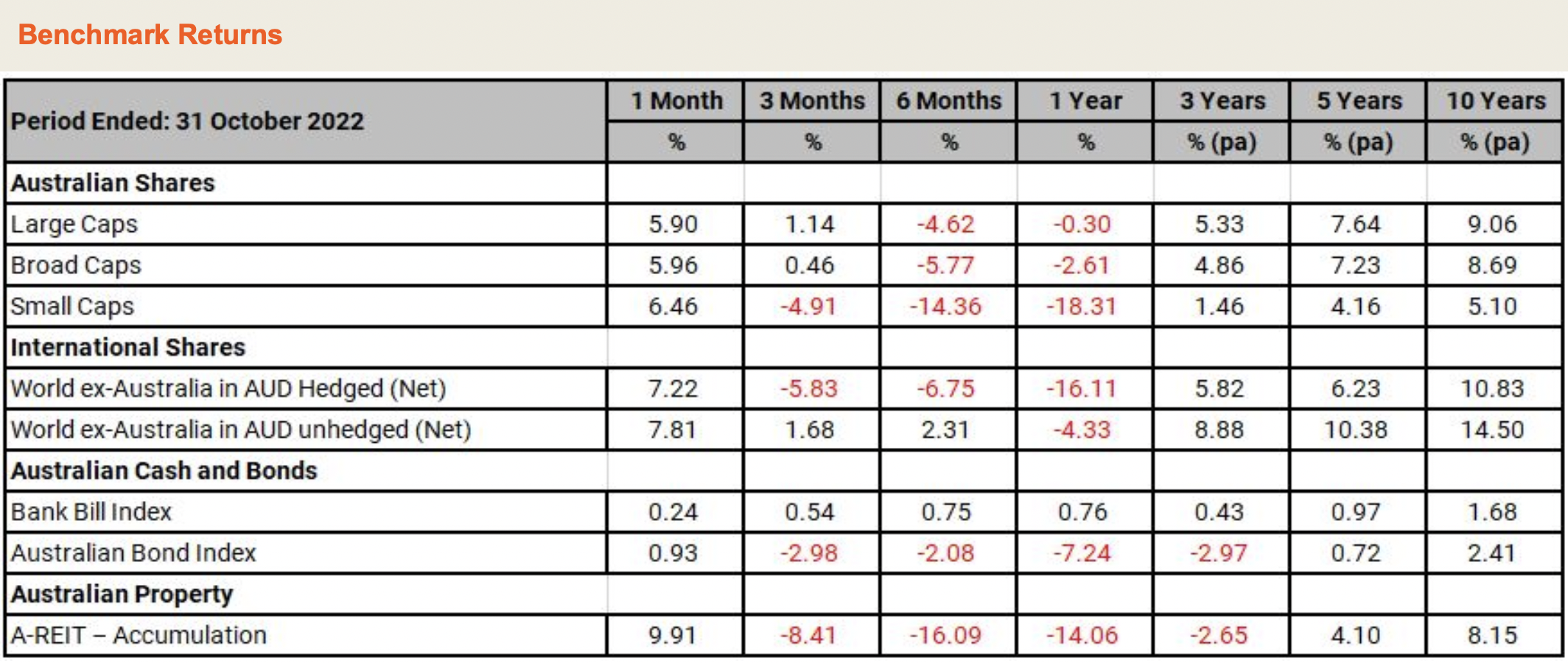Financial Insights October 2022
Equity markets surged in October after suffering steep losses in September. US GDP growth printed 2.6% in the third quarter and US inflation year-over-year to the end of September eased marginally to 8.2% from August’s reading of 8.3%.
The Australian share market was up 6% in October led by the Financials and Energy sector and falling Australian bond yields saw bond proxies such as AREITs gain 10.0% for the month. Currency-hedged international equities gained 7.2% while unhedged international equities rose by +7.8%, bolstered by a slightly weaker Australian dollar, trading at US$0.6399 at close of the month. Asian equities were down in the month, impacted by China’s stringent and ongoing zero COVID policy that is hampering growth in the region.
During the month, the European Central Bank (ECB) raised cash rates by 75bps to 1.50% as Eurozone inflation remains stubbornly high at around 10% year on year, heavily impacted by rising energy costs due to the ongoing war in Ukraine. Russia targeted key Ukrainian infrastructure assets in October with a barrage of missiles and suggested that it may suspend its participation in a grain export deal designed to underpin global food supplies, sending wheat prices temporarily soaring.
The RBA raised the cash rate in October by 25bps to 2.60%, surprising most bank economists that had expected a 50bp rate hike.
The Australian 10-year government bond yield fell by 13bps to 3.76% and the 2-year government bond yield fell by 8 bps to 3.23%. The US 10-year government bond yield increased by 22bps to close at 4.05% and the US 2-year government bond yield increased by 20bps to 4.48%.
Investors remain concerned that Central Banks’ commitment to tighter monetary policy may push nations into recession, there may be a silver lining if official rates peak earlier than expected in 2023.
KEY DEVELOPMENTS POST MONTH-END
The RBA raised the cash rate by a further 25bps in November to 2.85% and in its accompanying Statement noted that “…The Board expects that interest rates will need to increase further. But monetary policy is not on a pre-set path… If in future the Board judges that it needs to increase the cash rate in larger steps to secure the return of inflation to target, it will do so. Similarly, if the situation requires the Board to hold the cash rate steady for a period, it will do so. The Board is resolute in its determination to return inflation to target and will do what is needed to achieve this”.
Also in early November, the US Federal Reserve raised interest rates by 75bps to a target range of 3.75%-4%, a level not seen since early 2008.

Article source: Australian Unity
Important Information: Research Insights is a publication of Australian Unity Personal Financial Services Limited ABN 26 098 725 145 (AUPFS). Any advice in this article is general advice only and does not take into account the objectives, financial situation or needs of any particular person. It does not represent legal, tax or personal advice and should not be relied on as such. You should obtain financial advice relevant to your circumstances before making product decisions. Where appropriate, seek professional advice from a financial adviser. Where a particular financial product is mentioned, you should consider the Product Disclosure Statement before making any decisions in relation to the product and we make no guarantees regarding future performance or in relation to any particular outcome. Whilst every care has been taken in the preparation of this information, it may not remain current after the date of publication and Australian Unity Personal Financial Services Ltd (AUPFS) and its related bodies corporate make no representation as to its accuracy or completeness.



